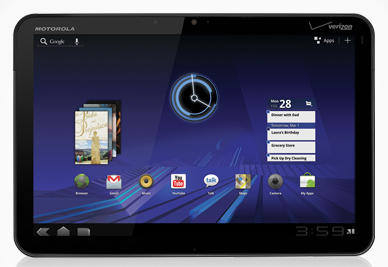Motorola XOOM and Honeycomb -- not ready for prime time


The XOOM hardware is solid and I will wait for a proper evaluation before I give impressions of the tablet. The bigger story is Google's Honeycomb, as the XOOM is the first product to ship with the version of Android optimized for tablets. Having poured over numerous reviews of the XOOM with Honeycomb that confirm my impressions of time with the OS, I can only conclude that the tablet version of Android is not ready for prime time.
When I played with a XOOM and Honeycomb this month, I left the experience with less than positive impressions. I found the interface to be too busy and distracting, something not very good in a mobile device. I also found the interface to be a bit inconsistent at times, which surprised me given earlier versions of Android. Interface objects would trigger different actions based on context, and I regularly had unintended things happen. It was not totally intuitive, and it needs to be. All in all my time with Honeycomb left me feeling that while it looks nice and is a radical change from the Android I am familiar with, I felt that tablets might be better served with an older version of Android onboard, for the time being.
Reviews of the XOOM and Honeycomb on the web have a recurring theme: it is definitely a version 1.0 of a tablet OS. Unfortunately, it really isn't. Android has been growing in popularity and evolving in capability for a while, and it doesn't do Google (or partners) a favor if Honeycomb as released is not fully baked. Google has made it clear that Honeycomb is required for tablets, and that may come back to bite them with early Honeycomb products. Apple has grabbed a majority of the tablet market with the iPad, and is about to release an updated version that will no doubt ratchet up the appeal to consumers. Honeycomb doesn't have a big time window to get finished; Google needed to hit the ground running with a tablet OS and it seems it has failed to do so.
What's the web saying about Honeycomb?
Engadget (Joshua Topolsky): "a lot of the new software feels like it isn't quite out of beta (surprise surprise). We had our fair share of force closes and bizarre freezes, particularly in the Market app and Movie Studio. Most applications were fine, but there definitely some moments where we felt like the whole device was teetering on the brink of a total crash."
CrunchGear (John Biggs): "if you open too many apps, it slows down to a crawl. The horrors that Apple seems to have avoided in iOS are readily apparent here. I had quite a few app crashes and many apps designed for 2.x devices crashed. Google Body, remade for Honeycomb, crashed every other try".
WSJ ( Walt Mossberg): "I've always felt that Android had a rough-around-the edges, geeky feel, with too many steps to do things and too much reliance on menus. But Honeycomb eliminates much of that". He went on to point out: "I found numerous apps in the Android Market that wouldn't work with the Xoom".
GigaOM (Kevin Tofel): "Honeycomb still has bugs to be worked out. Aside from some third-party apps crashing, the Android Market has crashed on me twice in a short time. And after Facebook crashed, the Facebook widget became completely non-responsive." There's good stuff too as Tofel also points out "Notifications are excellent, and competitors should take note."
Slashgear (Vincent Nguyen): "The first batch of Honeycomb slates may have some wrinkles – the missing Flash and paucity of video codec support being two examples – but 2011 definitely looks to be the year that Android tablets will come of age."
Conclusion
The purpose of this overview is not to bash Honeycomb; there are lots of great features that Google has produced in this first tablet version. But that's the problem: I'm not sure Google has the luxury of time to get the tablet experience nailed down to the point it is ready for consumer adoption. The recurring mention of crashes in early reviews is not something we should be hearing about a shipping product, and with the XOOM Honeycomb is indeed now shipping. Honeycomb needed to come out swinging for the fence, but it's still in batting practice.
I suspect the state of Honeycomb had a lot to do with HTC choosing to go with an earlier version of Android for its upcoming Flyer tablet. It would not product a tablet with a glitchy OS. I also believe that what I've seen (in person) of webOS on the HP TouchPad is a better and more solid experience on a tablet. Google has its work cut out for Honeycomb, and better move quickly.